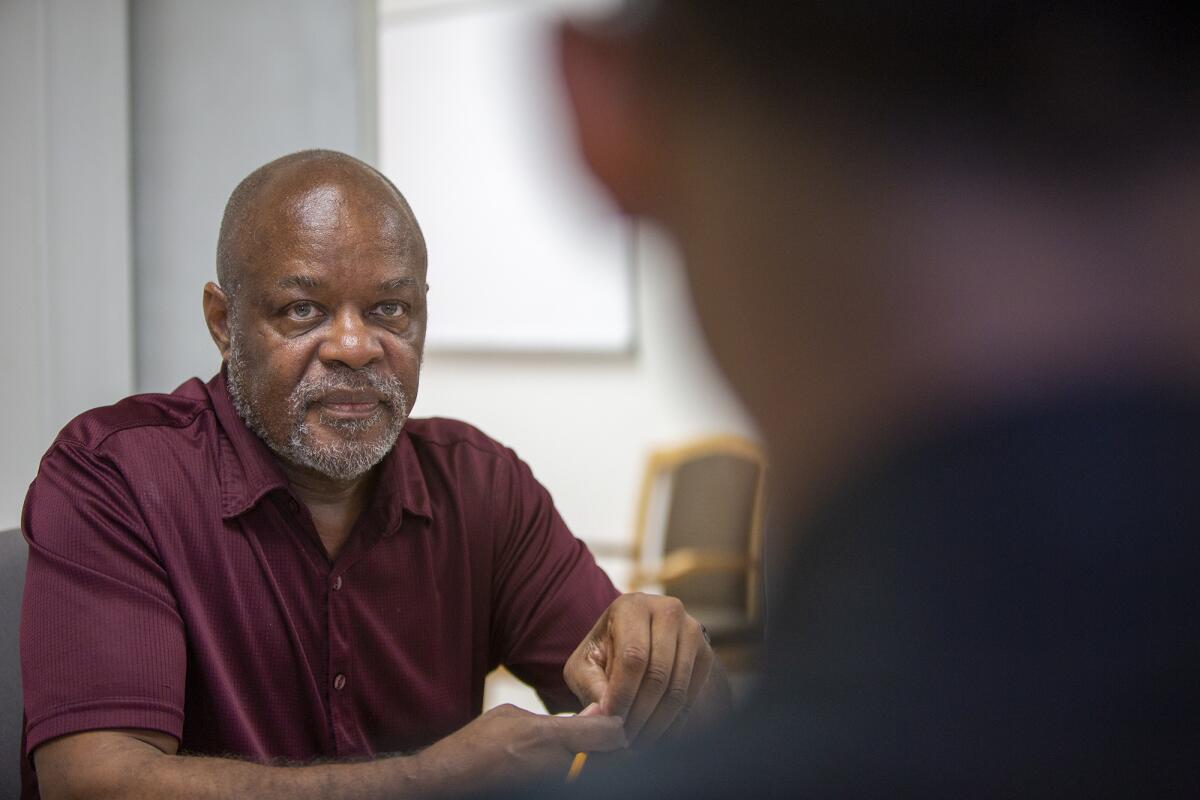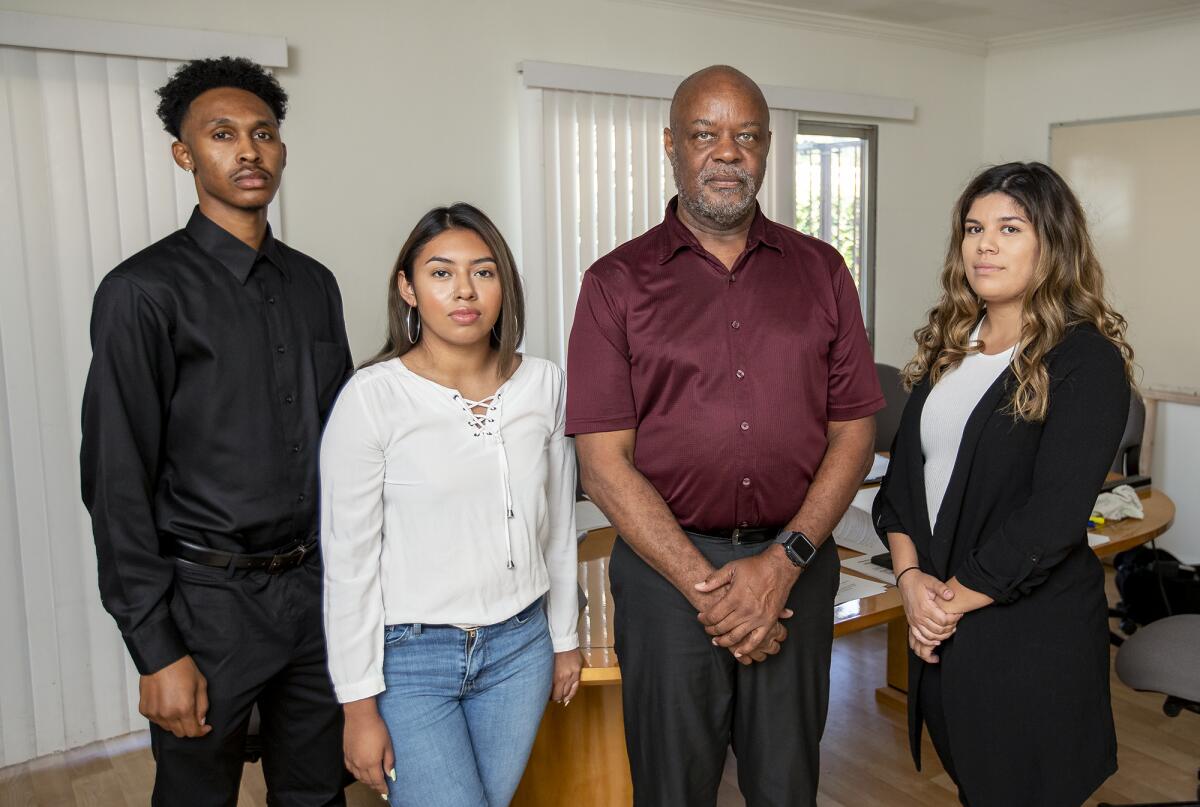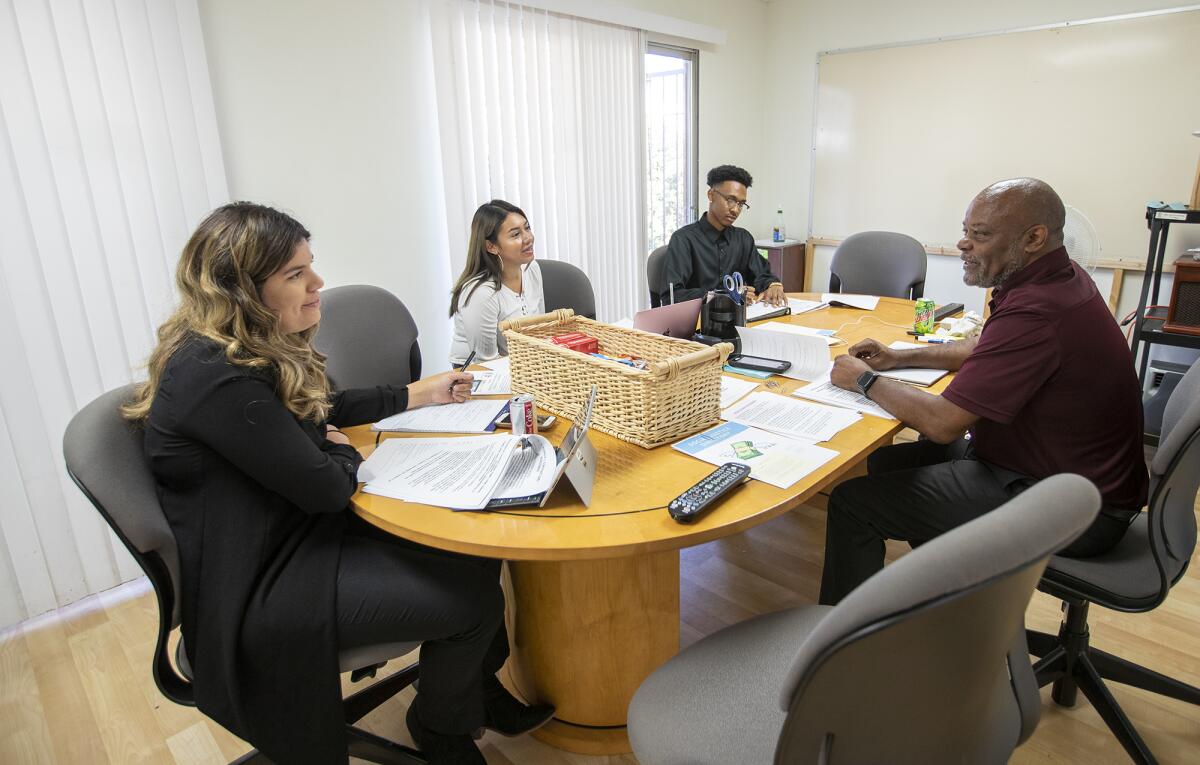O.C. private investigator C.J. Ford fights for ‘those nobody cares about’

- Share via
In private investigator C.J. Ford’s small Fullerton office sit 10 boxes that may hold salvation for a convicted murderer he believes is innocent.
Ford has spent countless hours poring over the contents of the boxes over the last decade since he took up the case of Kenneth Clair, who was sentenced to death in 1987 for the torture and murder of a neighbor with cerebral palsy in a Santa Ana home.
He will host a rally from 11 a.m. to 4 p.m. Jan. 12 at Santa Ana College to raise more awareness about the case and the flaws of the justice system.
The work is typical for Ford, who focuses on wrongful conviction cases. About half of his current workload is pro bono.
With limited resources and a small team of young part-time investigators, Ford is hoping he can win back the freedom of the unjustly condemned.
“We take the cases of those nobody cares about,” Ford said. “We have a soft heart in some ways. But, you have got to do something in life that means something.”

Ford, 65, of Anaheim has been a strong force behind Clair’s bid for exoneration, finding inconsistencies in the case and drawing public attention to it.
About four years ago, Ford started an online petition stating that Clair should be freed due to DNA evidence found at the scene that isn’t his.
The petition went viral and has collected more than 160,000 signatures.
In 2016, the 9th U.S. Circuit Court of Appeals overturned the death sentence due to mistakes made by Clair’s attorney. However, the court upheld the conviction, and he’s serving life without parole.
“The only way Kenneth Clair is going to be exonerated is through politics,” Ford said. “They’re never going to let the man have another trial. If he had another trial with all the evidence, the D.A. would lose. They already know that.”
Ford has drawn attention to various other issues with the case as well, including inconsistencies with the testimony of Clair’s ex-girlfriend and the account of a child who was at the Santa Ana home and told police a “white man” had been there the night of the murder.
Asst. Public Defender Scott Sanders, who looked over the case in 2015 at Ford’s behest, said the case has several glaring issues, but it would require years of effort to appeal it.
“C.J. can only do so much on this,” Sanders said. “Ultimately it has to be carried forward by lawyers. The problem with these old capital cases — it’s so hard to undo them ... Courts are so reluctant to disturb verdicts. Sometimes you need that person who is just relentless. That’s what he has been.”
Roberta Harding, an attorney who worked on the case for a few years in the early 1990s, attested to Ford’s tenacity.
“He’s like a dog with a bone,” Harding said. “He’s like, ‘I am not going to let this go until I get what I am looking for.’ ”
“Where would Kenneth Clair be without C.J.?” Sanders said. “I wouldn’t want to imagine.”

Ford grew up in York, Pennsylvania in a community divided along racial lines. He explained that just navigating the city required a blueprint knowledge of the its havens and shortcuts.
“It was really a prejudiced place,” Ford said. “There were always incidents so we had to have our guys with us. If we went to the Italian side of town, we better get ready to run or we’d get our behinds beat.
“The only place in neutral territory was the boy’s club. But you couldn’t go through the Puerto Rican neighborhood to get there. We had all kinds of ways to cross the city to go to different places.”
Ford’s family moved to an all-white neighborhood in Anaheim when he was 13.
Ford explained that most black families at the time lived in a few areas in Fullerton, Santa Ana and Placentia, but “my dad didn’t want that.”
Ford’s first full-time job was as an auto parts salesman. He eventually started his own auto parts business. When that faltered, he started on another business venture — what he called “the first indoor swap meet.”
The entrepreneurial Ford always had his sights set on working for himself. No bosses needed.
The birth of what would become his private investigator career began in his early 30s when he met a bounty hunter while working security for a club in Riverside.
“He told me I could make a lot of money, and I wasn’t doing anything else,” Ford said, smiling. “That was back in the day when I could still run.”
After working a few “skips” — locating those who jump bail — Ford decided to break out on his own.
Ford’s research skills, trustworthiness and ability to find just about anyone fueled his ascent in bounty hunting.
Ford gained the trust of local gangs and pimps.
“There was this one motorcycle gang and when one of them skipped I was the one to take them in,” Ford said. “They said, ‘Well, you come out to such and such a place and that person will be there waiting for you.’ I would go out there and that person would be chained to a pole. And I would take them in.”
When one of the pimps of Anaheim had a legal issue with a prostitute, they’d turn to Ford, usually showing up at his doorstep in a limo — much to his wife’s dismay.
“I would have to cuff them in the back office and take them to jail the next day,” he said.
The work was demanding and dangerous. Ford would sometimes leave the house on Monday and come back at the end of the week. One instance in Anaheim almost ended up with him being hacked to pieces by a machete-wielding convict.
“I’ve been shot at and almost stabbed a few times doing that work,” Ford said. “It’s a hard way of making a living.”
Eventually, Ford’s wife tired of her husband’s long hours and advised him to get his private investigator license.
For the first decade of his private investigator career, Ford largely worked domestic cases, staking out cheating spouses embroiled in divorce litigation.
In the late 1990s, the state assigned Ford the cases of three defendants related to the Los Angeles Police Department’s storied Rampart corruption scandal, when more than 70 officers of the city’s Rampart anti-gang unit were found to have engaged in a spectrum of criminal acts.
During that time, Ford had his own brush-up with the police when he was pulled over for having tinted windows and detained for nearly 45 minutes because he wouldn’t allow officers to search his trunk. Half a dozen police cars and a helicopter gathered at the tense scene until they finally let him go.
“These experiences showed me the scope of injustice in this world,” Ford said.
Ford dropped the divorce cases a couple of decades ago and has since focused on criminal cases. His team completes thorough investigations for cases and sends them to nonprofits like the Innocence Project or a law school for the legal work. Ford has also worked with the American Civil Liberties Union.
His team is currently working on what he calls the “Social Justice Directory,” an attempt to make collaboration easier within the social justice community.
“I am trying to get the whole social justice community together,” Ford said. “We want to make our mark on the system.”
Ford spends 16 hours a day in his office, except for Saturday, when he goes to church for most of the day.
Well into the night, the lamps burn.
Fingers trace across page after page as tired eyes search for the inconsistencies.
Rest doesn’t come easy to Ford. He knows that prisoners wait in guarded cells.
Some aren’t meant to be there.
All the latest on Orange County from Orange County.
Get our free TimesOC newsletter.
You may occasionally receive promotional content from the Daily Pilot.




